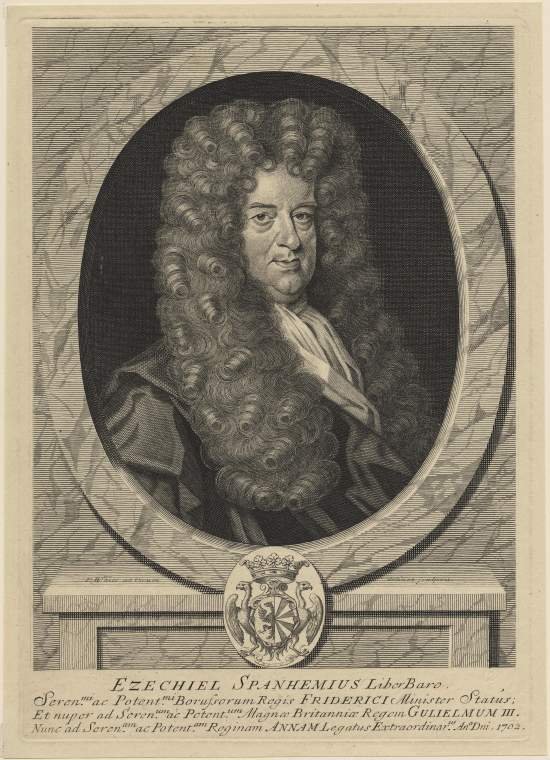Ezekiel, Freiherr Von Spanheim on:
[Wikipedia]
[Google]
[Amazon]
Ezekiel, Freiherr von Spanheim (also Ézéchiel, and known as Baron Spanheim) (7/18 December 1629 – 14/25 November 1710) was a Genevan diplomat and scholar.


Life
He was born atGeneva
Geneva ( , ; ) ; ; . is the List of cities in Switzerland, second-most populous city in Switzerland and the most populous in French-speaking Romandy. Situated in the southwest of the country, where the Rhône exits Lake Geneva, it is the ca ...
, the eldest son of Friedrich Spanheim the Elder. After 1642 he studied philology and theology at the University of Leyden
Leiden University (abbreviated as ''LEI''; ) is a public research university in Leiden, Netherlands. Established in 1575 by William, Prince of Orange as a Protestant institution, it holds the distinction of being the oldest university in the Neth ...
, and in 1650 returned to Geneva to be Professor of Rhetoric at Geneva.
In 1656 Spanheim became tutor to the son of Charles I Louis, Elector Palatine
Charles I Louis (; 22 December 1617 – 28 August 1680) was Elector Palatine from 1648 until his death. He was the second son of Frederick V of the Palatinate, the "Winter King" of Bohemia, and the British princess Elizabeth Stuart.
Aft ...
. Political theory led him into a diplomatic career. The Elector sent him in 1661 to Rome to investigate intrigues of the Roman Catholic Electors. After his return in 1665 the Elector employed him as ambassador at various courts, finally in England where after 1679 he was charged also with the affairs of the Elector of Brandenburg
This article lists the Margraves and Prince-elector, Electors of Margraviate of Brandenburg, Brandenburg during the time when Brandenburg was a constituent state of the Holy Roman Empire.
The Mark, or ''March'', of Brandenburg was one of the prima ...
. He was elected a Fellow of the Royal Society
Fellowship of the Royal Society (FRS, ForMemRS and HonFRS) is an award granted by the Fellows of the Royal Society of London to individuals who have made a "substantial contribution to the improvement of natural science, natural knowledge, incl ...
in 1679.
In 1680 he entered the service of electoral Brandenburg as minister of state. As ambassador of the Great Elector he spent nine years at the court of Paris, and subsequently devoted some years to studies in Berlin
Berlin ( ; ) is the Capital of Germany, capital and largest city of Germany, by both area and List of cities in Germany by population, population. With 3.7 million inhabitants, it has the List of cities in the European Union by population withi ...
; but after the Peace of Ryswick in 1697 he returned as ambassador to France where he remained until 1702.
In 1702, he went on his final diplomatic mission, as the first Prussia
Prussia (; ; Old Prussian: ''Prūsija'') was a Germans, German state centred on the North European Plain that originated from the 1525 secularization of the Prussia (region), Prussian part of the State of the Teutonic Order. For centuries, ...
n ambassador to England, where he served until his death in 1710. In the wake of Frederick I's assumption of the royal title he was the first royal ambassador dispatched and received in London, ceremonial honours befitting this status. He regularly took part in ceremonial processions and public thanksgivings in London. In 1706 he was granted a departure gift of £1000 from Queen Anne
Anne, alternatively spelled Ann, is a form of the Latin female name Anna (name), Anna. This in turn is a representation of the Hebrew Hannah (given name), Hannah, which means 'favour' or 'grace'. Related names include Annie (given name), Annie a ...
, though he was quickly reinstated. After his death, his daughter received an additional departure gift of £1000. He died in London in 1710 and was buried in Westminster Abbey
Westminster Abbey, formally titled the Collegiate Church of Saint Peter at Westminster, is an Anglican church in the City of Westminster, London, England. Since 1066, it has been the location of the coronations of 40 English and British m ...
.
Works
His major works are ''Disputationes de usu et præstantia numismatum antiquorum'' (Rome, 1664; in 2 vols., London and Amsterdam, 1706–17) and ''Orbis Romanus'' (London, 1704; Halle, 1738), whichEdward Gibbon
Edward Gibbon (; 8 May 173716 January 1794) was an English essayist, historian, and politician. His most important work, ''The History of the Decline and Fall of the Roman Empire'', published in six volumes between 1776 and 1789, is known for ...
used as a source for his monumental The Decline and Fall of the Roman Empire
''The History of the Decline and Fall of the Roman Empire'', sometimes shortened to ''Decline and Fall of the Roman Empire'', is a six-volume work by the English historian Edward Gibbon. The six volumes cover, from 98 to 1590, the peak of the Ro ...
. He also edited with Petavius the ''Opera'' of Cyril of Alexandria
Cyril of Alexandria (; or ⲡⲓ̀ⲁⲅⲓⲟⲥ Ⲕⲓⲣⲓⲗⲗⲟⲥ; 376–444) was the Patriarch of Alexandria from 412 to 444. He was enthroned when the city was at the height of its influence and power within the Roman Empire ...
and of the Emperor Julian
Julian (; ; 331 – 26 June 363) was the Caesar (title), Caesar of the West from 355 to 360 and Roman emperor from 361 to 363, as well as a notable philosopher and author in Ancient Greek, Greek. His rejection of Christianity, and his promoti ...
(Leipzig, 1696).
References
*http://www.ccel.org/ccel/schaff/encyc11/Page_35.htmlNotes
;AttributionExternal links
* http://www.bautz.de/bbkl//s/spanheim_e.shtml.shtml {{DEFAULTSORT:Spanheim, Ezekiel 1629 births 1710 deaths Writers from the Republic of Geneva Diplomats from the Republic of Geneva Fellows of the Royal Society Swiss numismatists